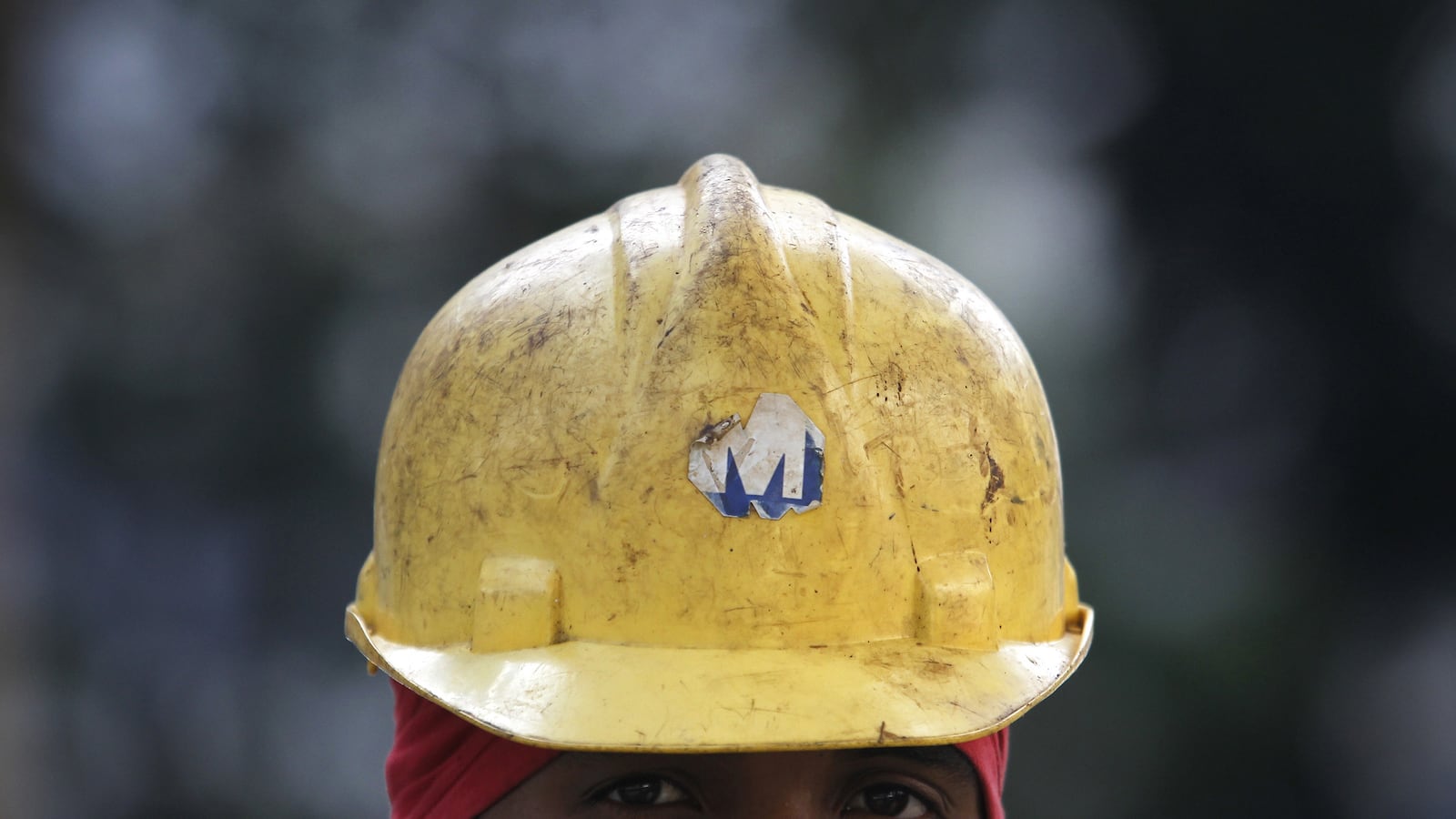For Zahir (not his real name), the wealthy city-state of Singapore was meant to be his chance to make it rich. The Bangladeshi was so convinced it would be worth his while to move there that he paid $8,000 to a training center in his home country for placement as an electrician with a construction subcontractor.

It took him three years of hard work to earn that money back. Six years later, he finds himself laid low with multiple injuries from a workplace accident and an uncertain future. He is unable to work or earn an income, yet required to stay in the country until the government ministry concludes their investigation into his case—the only means by which he could receive any compensation for his injuries.
Zahir's story is typical of the steep price paid by low-wage migrant workers who are helping the island nation with its non-stop progress. Singapore is small in size but not in ambition. New buildings spring up all the time, with others torn down, refurbished or rebuilt. Zahir is not the only one who has been drawn to the opportunities: government statistics show that, as of June 2013, there are 306,500 construction workers on work permits in Singapore, from countries as varied as Bangladesh, China and Myanmar.
For many workers, their time in Singapore involves an intricate web of deals, kickbacks, dodgy contracts, exploitation and abuse. Most have paid agents serious amounts of money to find work in the country. What they find, however, can be a nightmare.
“Wage theft is the most common problem,” says social worker Jolovan Wham, who has spent the past nine years working on migrant rights issues in Singapore. “The absence of a minimum wage law results in many workers earning below subsistence levels.”
Construction workers don't get issued regular work visas; they are considered "transient workers," welcome in Singapore only for the labor they are doing. The rules stipulated in their work permits bar them from marrying Singaporean citizens (unless approved by the government) and from changing jobs. With permission to be in Singapore conditional upon their employer, workers are discouraged from rocking the boat. Complain too much and you could find your work permit cancelled and your right to remain in Singapore withdrawn. An unlucky worker might even find himself forcibly repatriated.
This gives employers an enormous amount of power over their migrant workers. Activists say they've come across contracts with all sorts of unreasonable and downright illegal clauses. A 2008 contract from a subcontractor stipulated that workers would not be entitled to payment for overtime or work done on public holidays. Workers who complained to any government ministry could also be made to pay between $80—$240, which could account for about three to ten days' worth of wages, for the employers' trouble in addressing these complaints. And these are for the ‘lucky’ ones, who actually have contracts.
Zahir doesn’t have a written contract; his terms for work were verbally negotiated. He says he was originally promised a wage of $28 a day, but was only paid $22.
“I complained to my boss but he kept saying, ‘Next month I give you more money.’ But he never gave,” he says. But his employer liked him so much that he didn’t ask Zahir for a kickback before renewing his work permit; workers for other employers had to pay between $800—$1200 to continue working in Singapore.
Between agent fees and kickbacks, many find themselves in debt even before work begins. Reza (not his real name) is one such example. Twenty months ago, his family in Bangladesh borrowed money to pay a training center $7,236 for a job in Singapore mixing cement.
“Every month I made $400—$500. Makan [food] was about $100. I sent home $250—$300,” he says.
But it wasn’t enough for his father to pay off the creditors, who began to harass his parents. Hoping to send more money home, Reza began moonlighting for another company—an illegal but common practice.
Aware of the many problems a migrant worker might face—from exploitation to poor living conditions—the Singapore government deals with workers’ concerns through the Ministry of Manpower (MOM). They say that abuse and exploitation of vulnerable workers will not be tolerated. In a Facebook note, Acting Minister of Manpower Tan Chuan-jin wrote:
“[The Ministry of Manpower] intervenes to bring quick resolution to the issues. Most FWs [Foreign Workers] will have their cases attended to within two weeks from case registration. In 2010, more than 90% of employment disputes lodged by all workers were resolved through mediation within six weeks upon the Ministry’s intervention.”
Yet Wham’s experience of mediation tells a different story: “If it is a pay-related dispute, the government official assigned to the case may mediate against the interests of the workers, even to the extent that labor laws are not adhered to. If an employer refuses to pay up even when a court order has been issued, there is little a worker can do. Without any income, pursuing justice is an uphill battle.”
"Effectiveness is generally quite high, but many workers' cases are compromised by evidence difficulties. For example, if they have not been provided with pay slips, or employers have sent home fellow-workers who could testify (in the injured worker's favor) how and when a workplace injury happened... and when evidence difficulties come into play, MOM's effectiveness can fall off the cliff," writes Alex Au, vice-president of migrant rights’ organization Transient Workers Count Too (TWC2), in an email. "Much depends on whether the MOM case officer involved is a paper pusher or someone seriously interested in arriving at a fair conclusion."
Sometimes the story of a migrant worker takes an even sadder turn. In March 2013, Zahir had a serious accident. He says was working on the 21st story of a new 24-story building, waiting for heavy cables to be hauled up through a hole in the concrete floor. While he was distracted by the next cable coming up, seven cables that had already been fixed in place above him came down, wrapped around his head, and yanked him into the concrete, smashing his face. It took 12 surgeries for doctors to carry out extensive facial reconstruction. According to Singapore’s Workplace Injury Compensation Act, employees are entitled to medical care, medical leave wage and compensation. But after two and a half months, Zahir says, his employer—the one who had previously liked him so much—refused to pay for the mounting hospital bills. “I was very good,” he says. “But now I have an accident, I’m no good.”
Debbie Fordyce from TWC2 is helping Zahir with his case. “Resolution of cases [that are being investigated by MOM] can take years,” she says. In that time, there is almost no support for the worker; they are expected to stay in Singapore on their own dime, unable to work. Case workers say that even those who receive some food and lodging from their employer may be housed in conditions unsuitable for recovery. Many work illegally to support themselves, and often turn towards organizations like TWC2 for help.
This is the position that Zahir is now in. He is still in need of further treatment; TWC2 is paying for him to undergo socket reconstruction so he can have a prosthetic eye. When MOM completes its investigation—no one is sure of when that will be—Zahir will be able to receive compensation and go home.
For Reza, attempting to pay off his debt has led to tragic consequences. He injured his leg while working with metal plates in his second job, and neither his primary employer or his moonlighting job will take responsibility. MOM is looking into his case, but Fordyce isn’t very optimistic because he was working illegally. “I think compensation is a pipe-dream,” she says. Reza is likely to go back to Bangladesh empty-handed.
It's unlikely that the reliance on low-wage construction workers will end anytime soon. Eager to continue Singapore’s upward trajectory in terms of economic success, the government finds itself balancing their vision for the future with concerns for the welfare of such workers.
Which side will win in such a game of trade-offs? A comment Member of Parliament and chairman of the Migrant Workers Centre Yeo Guat Kwang made in 2010 might give an indication: "When we look at the migrant workers’ issue, we are not looking at it from the perspective of human rights… At the end of the day, whatever factors would be able to help us to sustain the growth of the economy for the benefit of our countrymen, for the benefit of our country; we will definitely go for it.”






